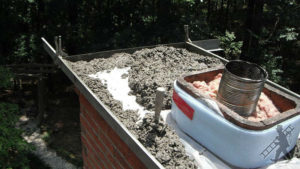While winter weather keeps many of us inside, the combination of rain, snow, ice, and freezing temperatures can cause significant damage to your chimney. If left untreated and unrepaired, damage from what is known as the freeze thaw cycle can cause masonry to spall, fall away, and can even affect the structural stability of your chimney.
Explaining the freeze thaw cycle
Bricks and mortar are a naturally semi-porous building material; this makes them ideal for fireplace and chimney construction as trapped gasses can safely pass through them to the outside. Unfortunately, being semi-porous also means moisture can be absorbed by the masonry.
Normal, healthy masonry will only absorb miniscule, almost undetectable amounts of water. However, if masonry is cracked, has chips or holes, or has other damage is may be more susceptible to water entry. During the winter, the water absorbed by the masonry will freeze; as with all water, the freezing water in the bricks will expand. Once it thaws, this leaves behind a bigger space that allows progressively more and more water to be absorbed by the masonry.
This process of repeated water absorption, freezing, thawing, and progressive damage is known as the freeze thaw cycle The freeze thaw cycle can cause extensive damage to a chimney structure, sometimes in as little as a single winter.
How water gets in
While healthy masonry in good condition will only absorb tiny amounts of water, damaged bricks are at significantly greater risk of water absorption and the damaging freeze thaw cycle. The following are three ways that masonry can be damaged enough to allow water in.
- Pressure washing: If bricks and mortar are stained or dirty, pressure washing may seem like a cheap and easy way to refresh your chimney. Unfortunately, the extreme water pressure sprayed directly onto the masonry can do more harm than good, creating chips, cracks, holes, and forcing water into the bricks and mortar.
- Building with the wrong bricks: Not all bricks are the same; if your chimney was patched or partially rebuilt using the wrong kind of bricks, the new masonry may be more susceptible to water damage. This is commonly seen in cases when old, recycled, or repurposed bricks are used as the primary building material.
- Existing damage: Masonry can be damaged by more than water. Cracks or holes to the masonry caused by storms, animals, or other damage to the roofline can all leave holes and cracks that let moisture in.
Preventing water damage 
There are preventative steps homeowners can take to protect their chimneys against moisture damage and the freeze thaw cycle. One of the best ways to proactively protect your chimney is by having it waterproofed. During the waterproofing, a special masonry-specific protectant is applied to the bricks and mortar; these products allow trapped water and gas to evaporate, but do not let new water in. Waterproofing can also be used as a way to keep existing freeze thaw damage from getting worse by preventing new water from being absorbed.
The freeze thaw cycle can damage the masonry of your chimney to the point of causing structural instability. To protect your chimney against water damage and the freeze thaw cycle, contact NewBuck Chimney Services today!
